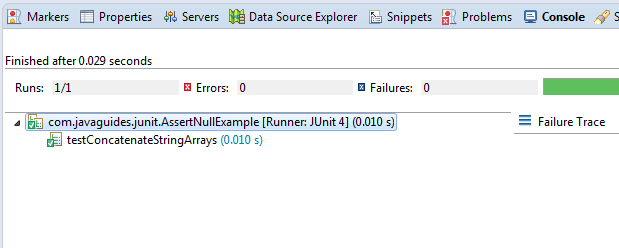🎓 Top 15 Udemy Courses (80-90% Discount): My Udemy Courses - Ramesh Fadatare — All my Udemy courses are real-time and project oriented courses.
▶️ Subscribe to My YouTube Channel (178K+ subscribers): Java Guides on YouTube
▶️ For AI, ChatGPT, Web, Tech, and Generative AI, subscribe to another channel: Ramesh Fadatare on YouTube
In this post, we will demonstrate how to use Assert.assertNull() method with an example.
Check out JUnit 5 tutorials and examples at JUnit 5 TutorialIn JUnit 5, all JUnit 4 assertion methods are moved to org.junit.jupiter.api.Assertions class.
When to use assertNull() method or assertion
When we want to test if an object is null we can use the assertNull assertion.
void org.junit.Assert.assertNull(Object object)
Asserts that an object is null. If it isn't an AssertionError is thrown.
Parameters:
- object - Object to check or null
Assert.assertNull(Object object) Method Example
import static org.junit.Assert.assertArrayEquals;
import static org.junit.Assert.assertEquals;
import static org.junit.Assert.assertNull;
import org.junit.Test;
public class AssertNullExample {
/**
* Concatenate the given {@code String} arrays into one,
* with overlapping array elements included twice.
* <p>The order of elements in the original arrays is preserved.
* @param array1 the first array (can be {@code null})
* @param array2 the second array (can be {@code null})
* @return the new array ({@code null} if both given arrays were {@code null})
*/
public static String[] concatenateStringArrays( final String[] array1, final String[] array2) {
if (array1 == null || array1.length == 0) {
return array2;
}
if (array2 == null || array2.length == 0) {
return array1;
}
final String[] newArr = new String[array1.length + array2.length];
System.arraycopy(array1, 0, newArr, 0, array1.length);
System.arraycopy(array2, 0, newArr, array1.length, array2.length);
return newArr;
}
@Test
public void testConcatenateStringArrays() {
final String[] input1 = new String[] {"myString2"};
final String[] input2 = new String[] {"myString1", "myString2"};
final String[] result = concatenateStringArrays(input1, input2);
assertNull(concatenateStringArrays(null, null));
assertEquals(3, result.length);
assertEquals("myString2", result[0]);
assertEquals("myString1", result[1]);
assertEquals("myString2", result[2]);
assertArrayEquals(input1, concatenateStringArrays(input1, null));
assertArrayEquals(input2, concatenateStringArrays(null, input2));
}
}
Output:
Related JUnit Examples
- JUnit Assert.assertArrayEquals() Method Example
- JUnit Assert.assertEquals() Method Example
- JUnit Assert.assertTrue() Method Example
- JUnit Assert.assertFalse() Method Example
- JUnit Assert.assertNull() Method Example
- JUnit Assert.assertNotNull() Method Example
- JUnit Assert.assertSame() Method Example
- JUnit Assert.assertNotSame() Method Example
- JUnit Assert.fail() Method Example




![[NEW] Full-Stack Java Development with Spring Boot 3 & React Build 5 Spring Boot Projects with Java: Line-by-Line Coding](https://img-c.udemycdn.com/course/750x422/5338984_4d3a_5.jpg)











Comments
Post a Comment
Leave Comment